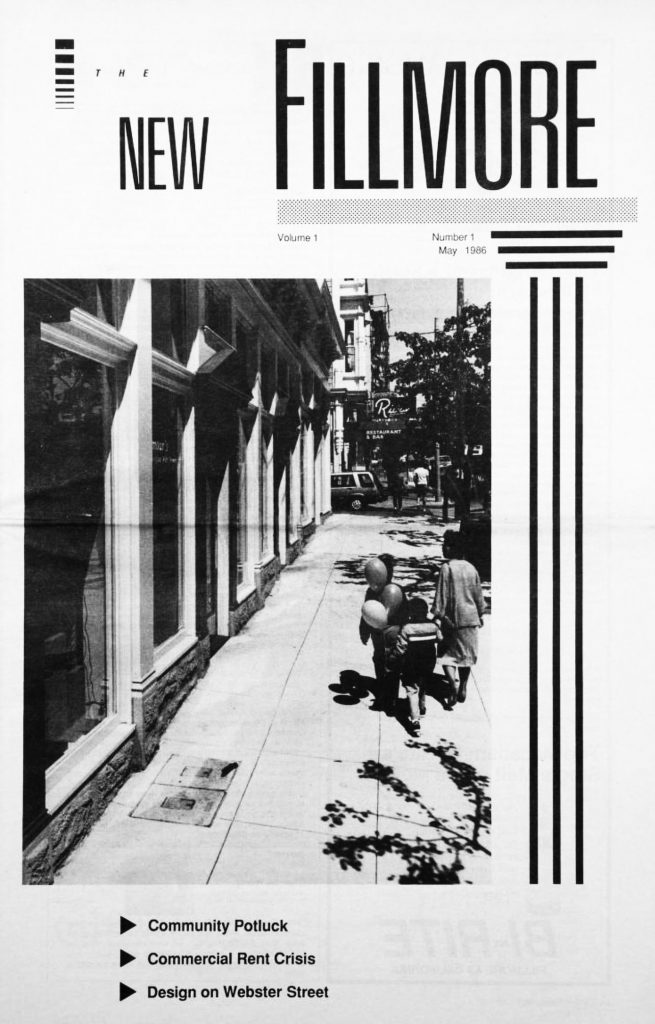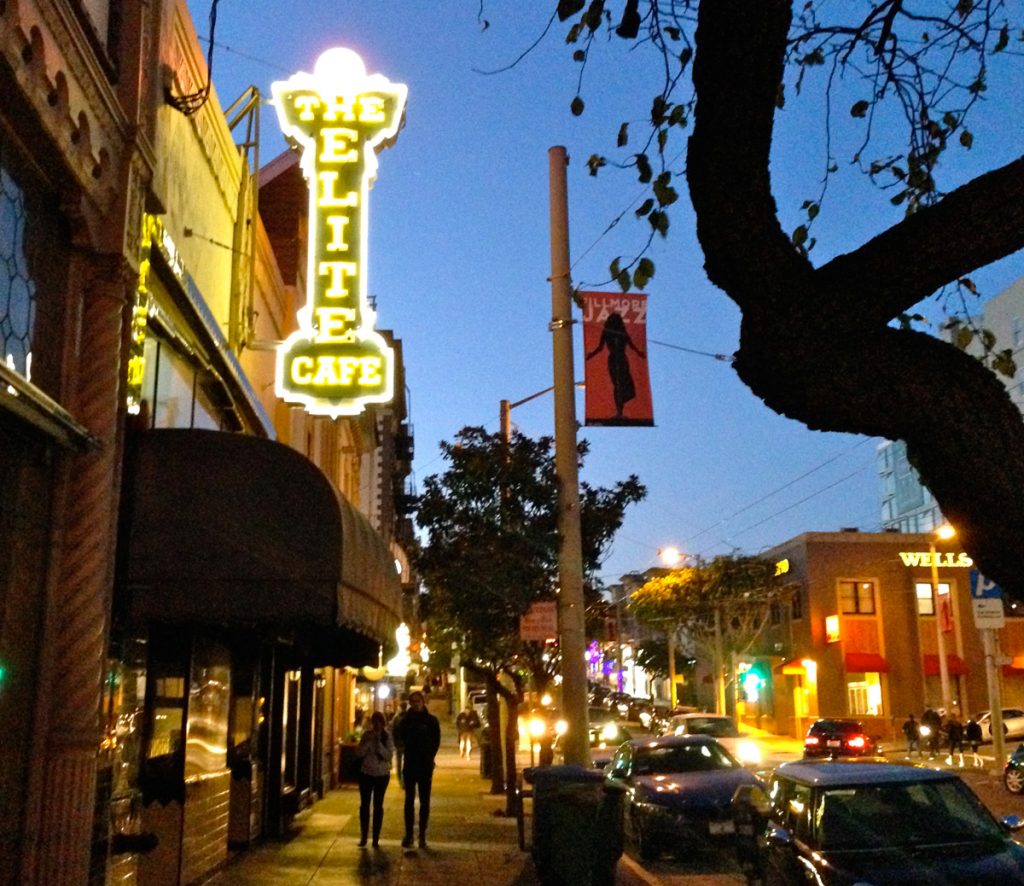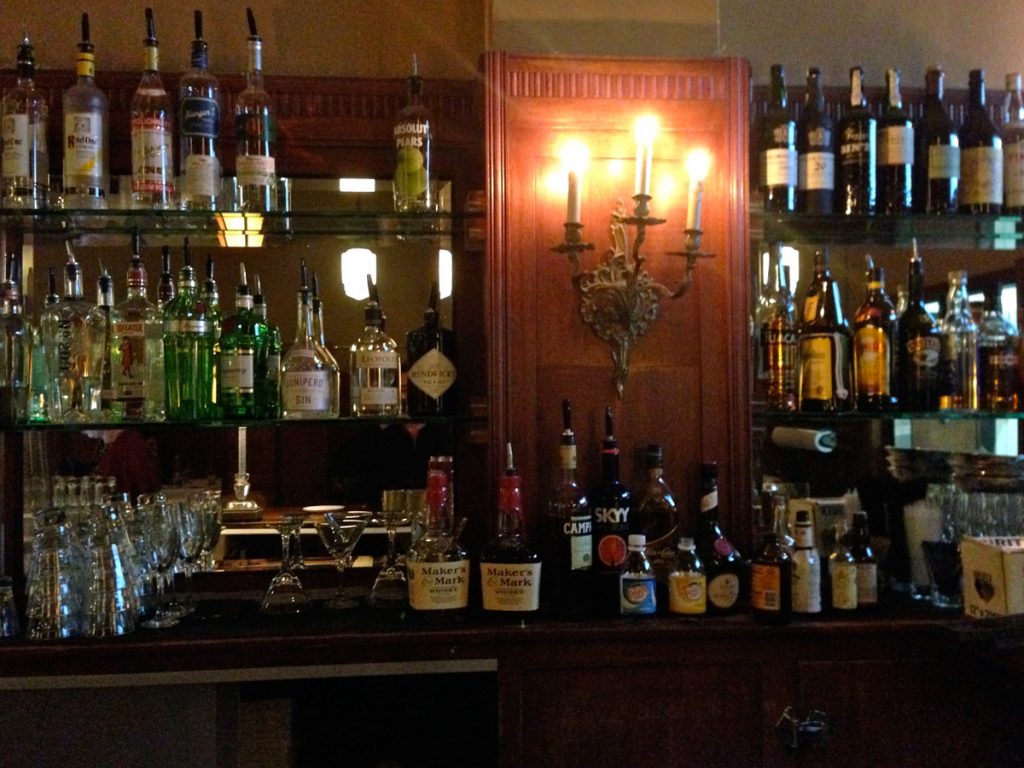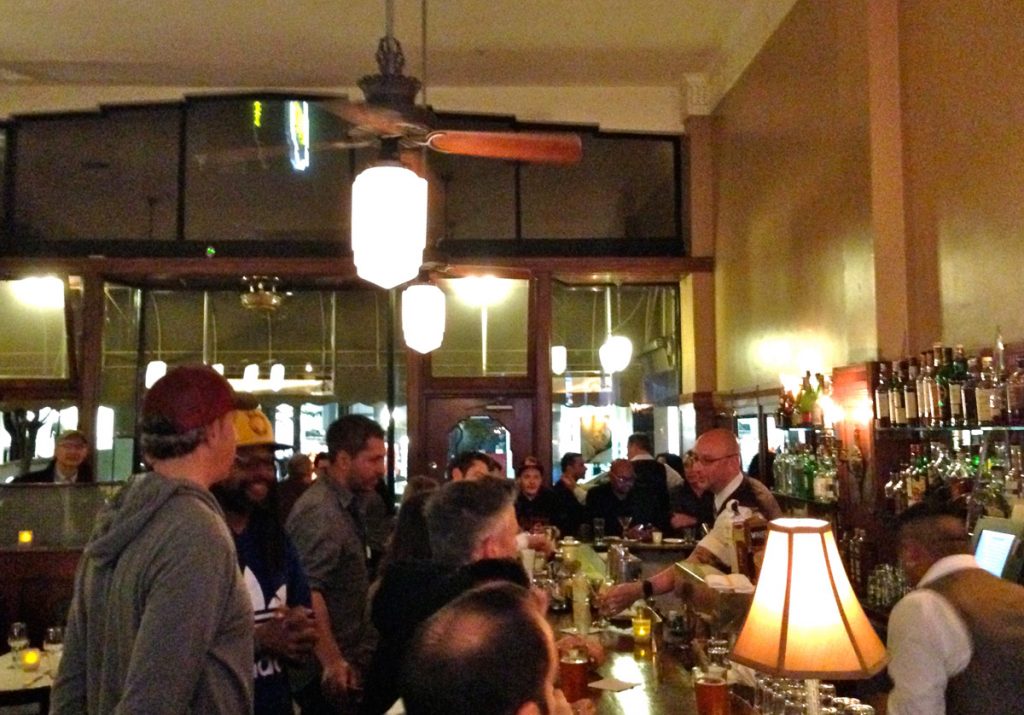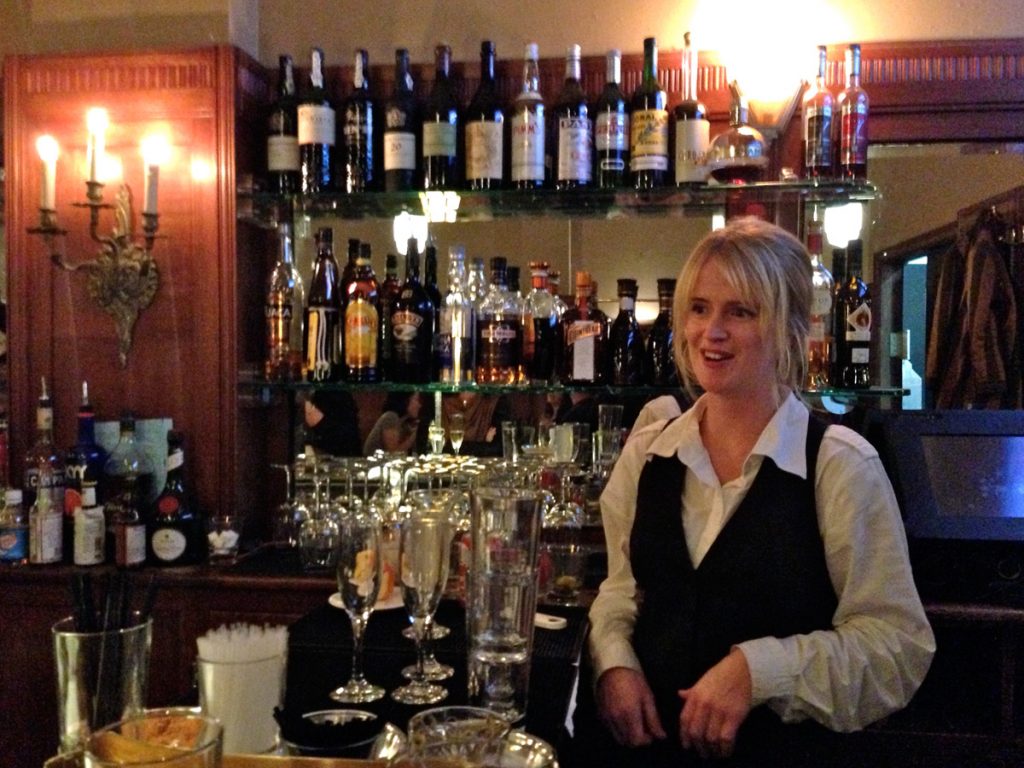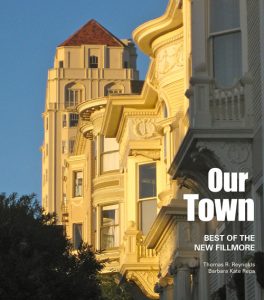By THOMAS REYNOLDS
Stop by the Elite Cafe on a Wednesday night in early March to meet a friend for a drink and the bartender asks: “Have you heard? The Elite’s been sold.”
It’s a shock. For 35 years a mainstay on Fillmore Street, its classic neon sign a beacon at the heart of the neighborhood, the Elite looks like a place that has always been there — and for nearly a century, it has. It opened across the street in 1928 as the Lincoln Grill. In 1932, during the dry years of Prohibition, it became the Asia Cafe, which is what the neon sign spelled out for the next half century. It became the Elite Cafe in 1981.
Peter Snyderman took over a decade ago, after swearing he would never run another restaurant when he closed the Alta Plaza at Fillmore and Clay. “You don’t get an opportunity to own a place like the Elite very often,” he reminisces before heading in for the final brunch on Easter Sunday, March 27. “But I realized it was time to let someone else breathe new life into the Elite.”
The new owners will keep the name and the look and the New Orleans flavor, he promises. “It’s not part of the deal, but it’s part of the understanding,” Snyderman says. New owner Andy Chun, a rising restaurateur, confirms much will stay the same.
“It just means so much to so many people,” Chun says. “When an opportunity came up to do something with the Elite, we wanted to keep it the Elite and make it the best it can be.”
Legendary San Francisco restaurateur Sam DuVall is the father of the Elite Cafe. When he opened it in 1981, his timing was chancy. The space had been sitting empty for a couple of years after the Asia Cafe closed. Fillmore was lined with modest neighborhood shops and was deemed dicey.
DuVall was competing for the shuttered Asia Cafe with Jeremiah Tower, a superstar chef of the era. A leasing agent just getting her start at the Edward Plant Co., Carol Chait, represented the owners of the building. And it all came down to a dead rat.
“I was showing the place to Jeremiah,” Chait says. “There was crap all over the floor and all of a sudden I saw this rat in the corner. It was dead, but I was afraid to pick it up. I asked Jeremiah to put it in the trash, but he didn’t want to touch it, either. Later that day I was showing the space to Sam DuVall and I said, ‘Sam, would you do me a favor and get rid of that thing?’ He did — and he also had the best ideas for revitalizing the restaurant. I said to the owner, ‘Sam’s your guy.’ ”
DuVall undertook a painstaking restoration of the space, reworking and rewiring the Asia Cafe sign out front to proclaim it the Elite Cafe. DuVall says he took the name from a favorite eatery in his hometown of Jackson, Mississippi.
“It was a good name, but I used it tongue-in-cheek, since it wasn’t really very elite at the time,” says DuVall. But now, he says, “The place is a historical landmark. People love it. It’s part of San Francisco history.”
Duvall later sold the Elite to Tom Clendening, who owned it for several years. In 2005, Peter Snyderman heard Clendening might be looking to sell. He considered partnering with Perry Butler, owner of Perry’s on Union Street, who was also eyeing the Elite. But eventually Snyderman put together his own group of investors, made a deal, and got back in the game.
“We were brutalized by the renovation,” Snyderman says now. “It was in terrible disrepair. We pulled up the old green linoleum floor to find charred timbers — there’d been a fire.”
Snyderman had heard the rumors a bookie ring operated there when it was the Asia Cafe. When he began renovating, he found 50 telephone lines running into the basement.
“That’s an awful lot of phone numbers for one restaurant,” Snyderman says with a smile. “We love that part of the lore.”
When the renovation was complete, Snyderman had a hit on his hands — especially after he added 16 more seats outside on the sidewalk by putting four four-tops under newly installed heaters.
“We had a dramatic increase in business — a 60 percent increase over the old Elite,” he says.
It became a profitable endeavor — “and the percentage of restaurants that turn a profit is ridiculously low,” he says. “All of the investors have been paid back in full, plus more.”
Yet as he neared his 10th anniversary at the Elite, Snyderman began to realize he was ready to make a change. “It had been brewing for a while,” he says. “Those decimal points in life make you reflect on things.” So he quietly began contacting brokers, who quietly began speaking to people who might be interested in taking over. One broker thought the Elite would bring more than $1 million.
“She fell short,” is all Snyderman will say about the eventual selling price.
Meanwhile, Andy Chun and his team were making a name for themselves in San Francisco food and wine circles. Chun had started the Press Club, a wine bar at the base of the Four Seasons hotel and condominiums near Union Square, which grew out of a business plan he had developed while he was in business school at Dartmouth.
Then two years ago Chun took over Schroeder’s, the family-owned German restaurant in the Financial District, reinvigorating the 120-year-old beer hall while maintaining its culture and heritage.
In Chun and his team, Snyderman saw kindred spirits. “We were looking for someone who would continue the tradition,” Snyderman says. “We wanted someone to carry on while injecting new vigor. We wanted it to remain the Elite. We didn’t want somebody gutting it.”
And the owners of the building would not entertain the idea of a new operator who wanted to rip out the mahogany booths and bar their grandfather built with his own hands.
“Schroeder’s is the best analog for what we’re trying to accomplish at the Elite,” Chun says. “This exercise is very similar.”
Chun already has his chef: Schroeder’s chef Chris Borges, a native of New Orleans who was studying at Stanford to become a doctor before he gave in to his passion for food. Borges was executive chef of Taste catering when he took over the food at the Press Club, and later moved to Schroeder’s.
“He’s from New Orleans and he’s well-suited for this cuisine,” Chun says. “This is his homecoming.”
It’s also a homecoming of sorts for Chun, who lived in the neighborhood for 15 years, first at Jackson and Baker and later with his wife on Washington Street near Fillmore.
“The neighborhood is one we know well,” he says. “We’ve always had a soft spot for the Elite.”
It took months for the deal to come together. By the beginning of March, everything was set, except for the timing.
“We didn’t want to stay open and have the quality of things go down,” Snyderman says. “We wanted to end on a high note.”
The Elite’s chef, James London, provided the answer. He gave notice he was leaving at the end of March to drive home with his girlfriend to South Carolina and open his own restaurant.
“That settled it,” says Snyderman. He sent a heartfelt email to his staff on March 8, giving them three weeks notice that March 27 would be the Elite’s last day, and asking them to hang on through the end.
“As a whole, the staff has been really great,” Snyderman says. “They’ve all stuck it out. It made me very happy.”
During the final weeks — and especially during the last week — regular patrons boiled in for a final sazerac or martini or manhattan or two. Snyderman’s parents came in for a final meal, as did many groups of his friends and a legion of locals. One regular patron declared his dinner of pan-roasted salmon with beluga lentils, parsnip puree and salsa verde the best meal he’d had at the Elite in 30 years of dining there. The end was near, and yet it was a festive atmosphere, full of friends and neighbors, as it might have been in New Orleans.
Chun’s general manager at Schroeder’s, Teresa Breaux — another who knows New Orleans, and who will take on the GM role at the Elite — met with the Elite staff on March 23 and laid out the timeline, inviting those who were interested, and can wait three or four months, to be a part of the new Elite when it reopens this summer.
“We’d love to keep some of the current staff,” says Chun. “We want the Elite to be the kind of place you come to see friends.”
For his part, Peter Snyderman is looking forward to his freedom, but he realizes he is a lucky man.
“The Elite is a special place,” he says. “What a 10-year ride it has been.” And he says he now identifies with the slogan used by Patek Phillipe watches: You never actually own it. You merely look after it for the next generation.
With a little luck, the good times will be rolling again at the Elite Cafe by the Fillmore Jazz Festival in early July.
— Saloon critic Chris Barnett contributed to this story.
Filed under: Food, Drink & Lodging



